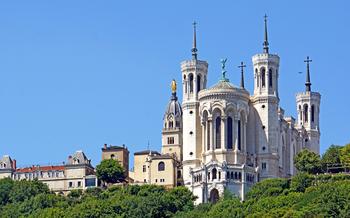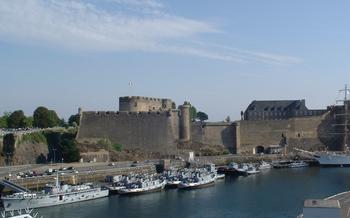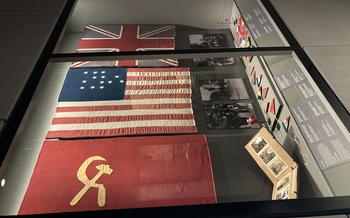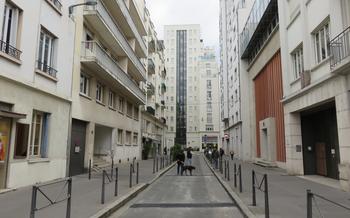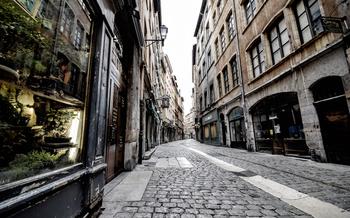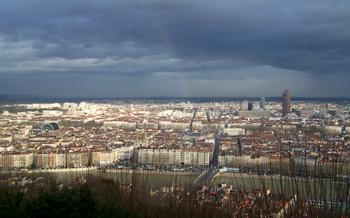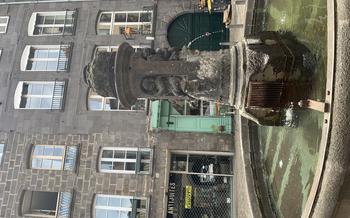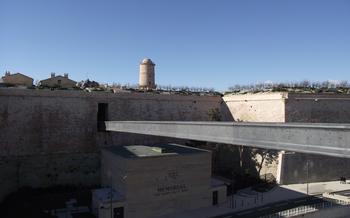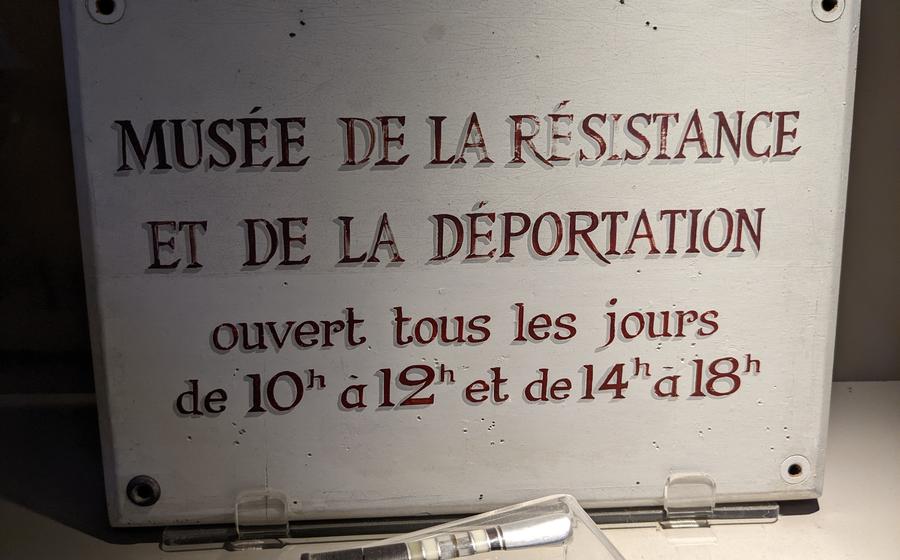
Centre d'histoire de la résistance et de la déportation
- The Centre d'histoire de la résistance et de la déportation
- World War II and Lyon's Role
- Exploring the Centre's Exhibits
- Honoring the Fallen
- Stories of Resistance and Resilience
- Understanding Collaboration and Betrayal
- The Role of Propaganda and Information Warfare:
- Post-War Trials and Reconciliation
- Educational Programs and Workshops
- Research and Documentation Center
- Events and Commemorations
- Museum Shop and Bookstore
- Accessibility and Visitor Information
- Insider Tip
- Nearby Attractions and Points of Interest
- Insider Tip: Embracing the Spirit of Resistance
The Centre d'histoire de la résistance et de la déportation
In the heart of Lyon, France, stands a poignant reminder of the city's enduring spirit during World War II – the Centre d'histoire de la résistance et de la déportation. This remarkable institution, inaugurated in 1992, is dedicated to preserving the memory of the French Resistance and commemorating the victims of Nazi persecution and deportation.
Situated in a 19th-century building on Rue Saint-Jean, the center is easily accessible by public transportation or on foot. Its mission is to document, research, and disseminate the history of the Resistance in Lyon and the surrounding region, paying tribute to those who fought against Nazi oppression.
The center's architectural design is both striking and symbolic. Its exterior facade is adorned with a series of bronze medallions depicting scenes of resistance and deportation, while the interior features a central courtyard that evokes the sense of confinement and isolation experienced by those imprisoned during the war.
World War II and Lyon's Role
During the dark days of World War II, Lyon emerged as a pivotal hub of resistance against the oppressive Nazi regime. Its strategic location at the confluence of the Rhône and Saône rivers, coupled with its industrial prowess, made it a vital center for both the French Resistance and the German occupiers. Lyon's vibrant history, characterized by its independent spirit and defiance against authority, contributed to its prominent role in the fight for freedom.
Key events unfolded in the city, including the heroic defense of Montluc Prison, where inmates staged a daring uprising against their captors. Lyon also served as a sanctuary for Jewish refugees fleeing persecution, with many finding refuge in the city's vibrant Jewish quarter. Notable figures associated with Lyon's resistance efforts include Jean Moulin, the legendary leader of the United Resistance Movement, and Lucie Aubrac, a courageous figure who played a crucial role in the Resistance's intelligence network.
Exploring the Centre's Exhibits
The Centre d'histoire de la résistance et de la déportation offers a wealth of exhibits that explore the history of the French Resistance and the city of Lyon during World War II.
The permanent exhibition, "Lyon, Capitale de la Résistance" (Lyon, Capital of the Resistance), provides a comprehensive overview of the city's role in the Resistance movement. Through artifacts, documents, and interactive displays, visitors can learn about the key events, organizations, and individuals involved in the fight against Nazi occupation.
Temporary exhibits and special events complement the permanent exhibition, offering visitors a deeper dive into specific aspects of the Resistance and its legacy. These exhibits often feature personal stories, artifacts, and multimedia presentations that bring the history of the era to life.
Educational resources and interactive displays are integrated throughout the center, making it an engaging and informative experience for visitors of all ages. Visitors can explore interactive maps, listen to audio testimonies, and engage with hands-on activities that help them understand the complexities of the war and its impact on the people of Lyon.
Honoring the Fallen
The Centre d'histoire de la résistance et de la déportation serves as a poignant tribute to those who lost their lives during World War II. Within its hallowed halls, visitors will find several memorials and tributes dedicated to commemorating the sacrifices made by countless individuals during this tumultuous period. A memorial wall inscribed with the names of fallen resistance fighters and civilians stands as a solemn reminder of the human cost of war. The center also hosts regular remembrance ceremonies and educational programs to ensure that the stories of those who perished are never forgotten. Through these initiatives, the center promotes reconciliation and peace by fostering a sense of remembrance and understanding.
Stories of Resistance and Resilience
Within the Centre d'histoire de la résistance et de la déportation, visitors are immersed in the extraordinary tales of individuals who defied the darkness of war and occupation. These stories of resistance and resilience showcase the indomitable spirit of the human heart in the face of adversity.
Through exhibits and interactive displays, visitors encounter the personal narratives of ordinary people who became extraordinary heroes. They learn about the sacrifices made, the risks taken, and the unwavering commitment to freedom that fueled the resistance movement.
The center's collection includes poignant letters, diaries, and artifacts that bring to life the struggles and triumphs of these individuals. Visitors are captivated by the courage of those who risked their lives to hide and transport downed Allied pilots, the ingenuity of those who forged false documents and sabotage plans, and the unwavering faith of those who never lost hope for liberation.
Exploring these stories serves as a powerful reminder of the human capacity for resilience and the importance of standing up for what is right, even in the face of overwhelming odds. Visitors leave the center inspired by the indomitable spirit of those who fought for freedom and determined to carry forward their legacy of courage and resilience.
Understanding Collaboration and Betrayal
During World War II, Lyon faced a complex interplay of collaboration and resistance. Some individuals chose to cooperate with the occupying forces, while others risked their lives to fight for freedom. The Centre d'histoire de la résistance et de la déportation delves into these dynamics, exploring the motivations and choices of individuals on both sides.
Exhibits shed light on the collaborationist regime established in Lyon and the collaborationist militias that supported it. Visitors learn about the collaborationist government's policies, including the persecution of Jews and other marginalized groups. The center also examines the role of the French police and administration in facilitating collaboration.
The center encourages critical thinking about the factors that led people to collaborate, including fear, opportunism, and ideological beliefs. It also explores the consequences of collaboration, both for individuals and for French society as a whole. Visitors are left to grapple with the complexities of human behavior in times of war and the moral dilemmas faced by individuals caught in the crossfire of history.
The Role of Propaganda and Information Warfare:
During World War II, propaganda played a crucial role in shaping public opinion and influencing the course of events. The Centre d'histoire de la résistance et de la déportation delves into the complex world of wartime propaganda, showcasing the techniques employed by both the Axis and Allied powers to sway hearts and minds. Visitors will explore the various forms of propaganda, including posters, leaflets, radio broadcasts, and films, and analyze their impact on the civilian population.
The exhibits highlight the use of propaganda to glorify the war effort, vilify the enemy, and boost morale. Visitors will gain an understanding of how propaganda can be used to manipulate emotions, distort facts, and create a sense of urgency. The center also examines the role of the media and communication during wartime and how they were used to disseminate propaganda and shape public opinion.
Through interactive displays and multimedia presentations, visitors will explore the consequences of propaganda, both during the war and in its aftermath. The exhibits challenge visitors to critically evaluate the use of propaganda today and to recognize its potential dangers. By shedding light on the mechanisms of propaganda, the Centre d'histoire de la résistance et de la déportation empowers visitors to become more discerning consumers of information and to resist the influence of manipulative messaging.
Post-War Trials and Reconciliation
The Centre d'histoire de la résistance et de la déportation delves into the complex aftermath of World War II, exploring the legal proceedings and trials of war criminals. It examines the challenges of reconciliation and forgiveness, addressing the intricate balance between seeking justice and promoting healing. Visitors gain insights into the legal framework established to prosecute those responsible for atrocities, as well as the complexities of navigating the desire for retribution and the need for societal harmony. The center's exhibits encourage critical reflection on the complexities of post-war justice and the ongoing quest for reconciliation and peace. By confronting this chapter of history, the center promotes understanding and dialogue, aiming to prevent future conflicts and build a more just and peaceful world.
Educational Programs and Workshops
The Centre d'histoire de la résistance et de la déportation offers a diverse range of educational programs and workshops designed to engage students of all ages in the exploration of World War II history and its enduring legacy. These initiatives aim to foster historical awareness, critical thinking skills, and a deeper understanding of the complexities of the war and its aftermath.
-
School Programs: The center collaborates with local schools to provide guided tours, interactive workshops, and educational resources tailored to different grade levels. These programs encourage students to learn about the Resistance, collaboration, and the impact of war on society.
-
University Partnerships: The center maintains partnerships with universities and research institutions, offering seminars, lectures, and research opportunities for students and scholars. These collaborations contribute to the advancement of historical knowledge and foster interdisciplinary dialogue.
-
Workshops and Events: The center organizes regular workshops, seminars, and events open to the public. These events feature guest speakers, historians, and experts who share their insights on various aspects of World War II and its aftermath, promoting a deeper understanding of the period.
-
Summer Camps: During the summer months, the center hosts summer camps for children and teenagers. These camps combine educational activities, historical exploration, and outdoor adventures to provide a fun and engaging learning experience.
-
Teacher Resources: The center's website offers a dedicated section for teachers, providing downloadable lesson plans, primary source materials, and teaching guides. These resources support educators in integrating World War II history into their classrooms.
-
Lifelong Learning: The center welcomes individuals of all ages who are interested in delving deeper into World War II history. Through lectures, workshops, and discussion groups, the center provides opportunities for lifelong learning and intellectual exploration.
Research and Documentation Center
The Centre d'histoire de la résistance et de la déportation houses a comprehensive research and documentation center open to scholars, historians, and the general public. This center is a treasure trove of historical materials related to World War II and the French Resistance, including original documents, archives, and databases.
Researchers can access a wide range of sources, including official reports, personal testimonies, photographs, and propaganda materials. The center's expert staff is available to assist researchers with their inquiries and provide guidance on navigating the extensive collection.
The center's research facilities support scholarly research and academic initiatives, fostering a deeper understanding of this critical period in history. The center also collaborates with universities and educational institutions to promote historical awareness and critical thinking skills among students of all ages.
Through its research and documentation center, the Centre d'histoire de la résistance et de la déportation plays a crucial role in preserving and disseminating historical knowledge, ensuring that the lessons of the past are not forgotten.
Events and Commemorations
The Centre d'histoire de la résistance et de la déportation regularly hosts a variety of events, lectures, and commemorations to engage the public and foster a sense of community and remembrance. These events offer unique opportunities to learn more about the history of the French Resistance, honor the fallen, and reflect on the lessons of the past.
Throughout the year, the center hosts temporary exhibitions, film screenings, and lectures by renowned historians, authors, and experts in the field. These events provide visitors with in-depth insights into specific aspects of the Resistance and its legacy. Special exhibitions often focus on lesser-known stories or perspectives, shedding light on the diverse experiences of those who fought against Nazi occupation.
Commemorations and memorial ceremonies are held annually to honor the sacrifices made by the men and women of the Resistance. These solemn events feature speeches, wreath-laying ceremonies, and moments of silence to pay tribute to those who lost their lives in the struggle for freedom.
The center also organizes educational workshops, interactive activities, and guided tours for students, families, and groups. These programs aim to promote historical awareness, critical thinking skills, and a deeper understanding of the complexities of the war and its aftermath.
By participating in these events and commemorations, visitors can gain a deeper appreciation for the courage and resilience of the French Resistance and reflect on the enduring legacy of their fight for freedom and justice.
Museum Shop and Bookstore
The Centre d'histoire de la résistance et de la déportation houses a well-stocked museum shop and bookstore, offering a wide range of publications, books, and souvenirs related to the history of the French Resistance and World War II. Visitors can purchase books by renowned historians, memoirs of resistance fighters, and in-depth analyses of the war's impact on Lyon and France. The shop also offers a selection of souvenirs, including replicas of resistance medals, posters, and postcards, allowing visitors to take a piece of history home with them.
Supporting the center's mission through sales, the museum shop plays a crucial role in promoting further learning and exploration of this significant period. By purchasing books and souvenirs, visitors directly contribute to the preservation and dissemination of historical knowledge. Additionally, the shop showcases local authors and historical works, highlighting the contributions of Lyon's literary community to the understanding of the war and its aftermath.
Accessibility and Visitor Information
Opening Hours: The Centre d'histoire de la résistance et de la déportation is open to the public from Tuesday to Sunday, from 10 am to 6 pm.
Admission Fees: Entrance to the center is free of charge for all visitors.
Guided Tours: Guided tours are available upon reservation, providing visitors with a deeper insight into the center's exhibits and historical context.
Accessibility for Visitors with Disabilities: The center is fully accessible to visitors with disabilities, featuring ramps, elevators, and accessible restrooms.
Multilingual Resources: The center offers multilingual resources, including audio guides and translations of exhibits in English, German, Spanish, and Italian, ensuring that visitors from diverse backgrounds can engage with the center's content.
Insider Tip
For a truly immersive experience, visit the center on a guided tour. The knowledgeable guides provide captivating insights into the stories of resistance and resilience, bringing the exhibits to life and offering a deeper understanding of this pivotal period in history.
Nearby Attractions and Points of Interest
In addition to the Centre d'histoire de la résistance et de la déportation, Lyon offers a wealth of other historical sites and cultural attractions for visitors to explore. Take advantage of your visit to trace the city's rich past at the Musée Gadagne, housed in a 16th-century mansion that delves into Lyon's history from Roman times to the present day. For a unique perspective, embark on a guided tour of the Traboules de Lyon, secret passageways that were once used by silk merchants to transport their goods discreetly.
Lyon's vibrant culinary scene is not to be missed. Indulge in a traditional bouchon Lyonnais, a type of bistro that serves regional specialties like quenelles de brochet (pike dumplings) and saucisson brioché (sausage in brioche). Take a cooking class to learn the secrets of Lyonnaise cuisine and savor the flavors of the city.
For a panoramic view of Lyon and its surroundings, ascend to the top of the Fourvière Hill. Here, you'll find the majestic Basilica of Notre-Dame de Fourvière, a symbol of the city, and the Gallo-Roman Museum, which offers a glimpse into Lyon's ancient past.
Lyon's cultural offerings extend beyond its historical attractions. Explore the vibrant contemporary art scene at the Musée d'Art Contemporain de Lyon, or immerse yourself in the world of cinema at the Institut Lumière, dedicated to the history of motion pictures. With its diverse range of attractions, Lyon offers a captivating blend of history, gastronomy, and culture, ensuring an unforgettable experience for every visitor.
Insider Tip: Embracing the Spirit of Resistance
As you explore the Centre d'histoire de la résistance et de la déportation, take a moment to step outside and wander through the surrounding neighborhood. Lyon's vibrant Croix-Rousse district, where the center is located, was a hotbed of resistance activity during the war. Its narrow cobbled streets, colorful murals, and independent boutiques offer a glimpse into the city's rich history and resilient spirit. Visit the nearby Place des Tapis, where a monument commemorates the courageous women of Lyon who risked their lives to support the Resistance. By immersing yourself in the neighborhood's atmosphere, you'll gain a deeper understanding of Lyon's role in the fight for freedom and the enduring legacy of the Resistance.
